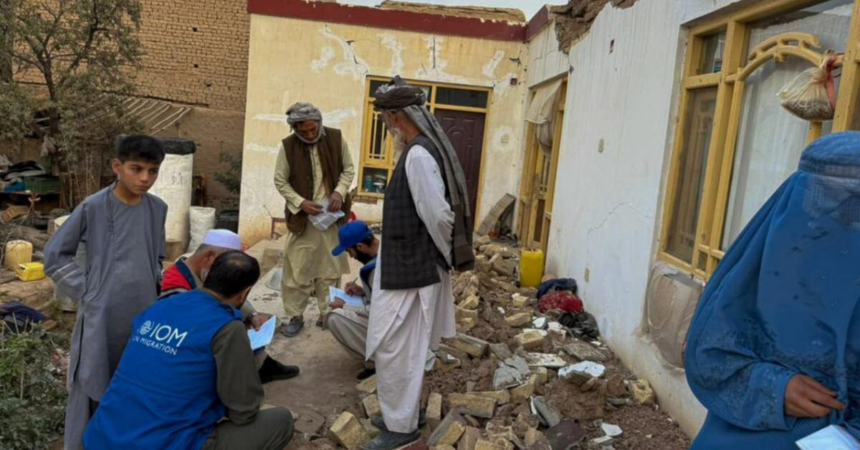RASC News Agency: The International Organization for Migration (IOM) has warned that thousands of Afghanistani families devastated by last week’s powerful earthquake in northern Afghanistan are now facing a new and merciless threat the freezing onset of winter, compounded by state indifference and administrative paralysis under Taliban rule.
In a statement released on Tuesday, November 10, the IOM said that most of the affected families have lost everything their homes, livestock, and livelihoods and are now struggling to survive in makeshift shelters, many built from plastic sheets and broken timber. “Families are doing all they can to keep warm and protect their children, but the conditions are deteriorating by the day,” the agency reported, warning of an impending humanitarian catastrophe unless urgent assistance is provided.
So far, relief teams have reached just over one thousand displaced families, distributing emergency tents, blankets, heaters, and basic food parcels. But the scale of destruction, the IOM added, far exceeds available resources, and international support remains insufficient. The organization called for swift and unimpeded humanitarian access, highlighting that Taliban-imposed restrictions, particularly the ban on women aid workers, continue to cripple emergency response operations.
The 6.3-magnitude earthquake, which struck on Sunday night last week, ravaged parts of Samangan Province and surrounding northern regions. According to the United Nations, at least 25 people were killed, nearly 1,000 others were injured, and hundreds of homes many built from unreinforced mud and clay were reduced to rubble. In several districts, entire families have been forced to sleep under open skies amid plunging nighttime temperatures.
A recent assessment by the UN Office for the Coordination of Humanitarian Affairs (OCHA) revealed that 305 houses were completely destroyed and another 490 suffered severe structural damage, leaving thousands without access to clean water, heating, or sanitation. Health workers have reported an alarming rise in respiratory infections among children due to cold exposure and overcrowding in temporary shelters.
The IOM warned that without immediate delivery of winter supplies and durable housing, the situation could spiral into a secondary humanitarian emergency. “Time is running out,” the agency stressed. “Families who have already endured the trauma of the earthquake are now being forced to endure the cruelty of winter, with little support and no clear leadership from those in power.”
Humanitarian experts say that the disaster has once again exposed the Taliban’s deep administrative incompetence and disregard for human welfare. More than two years after seizing power, the group has failed to establish functional governance systems or disaster-response frameworks, leaving international organizations to shoulder nearly all relief responsibilities.
Critics argue that the Taliban’s obsession with enforcing rigid social controls and gender segregation has taken precedence over national welfare. Female humanitarian workers essential to reaching women and children remain largely banned from participating in field operations, depriving thousands of Afghanistani women of life-saving aid.
“The Taliban’s governance model is a machine of control, not of compassion,” said one Kabul-based humanitarian coordinator, speaking anonymously for security reasons. “Their focus is on suppressing society, not saving it. Every earthquake, every flood, every hunger crisis becomes deadlier because the authorities refuse to allow professionals, especially women, to do their jobs.”
Meanwhile, communities across northern Afghanistan are struggling alone. In villages flattened by the quake, residents have begun rebuilding with bare hands, using fragments of collapsed walls as materials. “No one has come,” said a survivor from Samangan. “We have no tents, no blankets only our children and the cold.”
As temperatures continue to drop, the IOM warns that the convergence of natural disaster, economic collapse, and Taliban negligence could push thousands more Afghanistani families into irreversible destitution. The international community, it urged, must act swiftly and decisively not just with aid, but with accountability.
For many of Afghanistan’s most vulnerable citizens, winter has arrived but governance has not.






